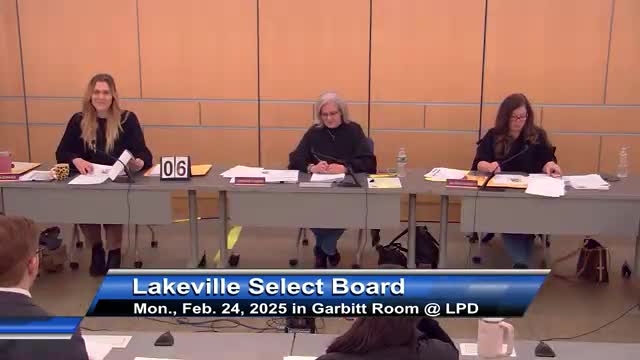Rhino asks Lakeville to submit municipal grant request to clean up former state hospital landfill
Get AI-powered insights, summaries, and transcripts
Subscribe
Summary
Rhino Capital representatives asked the Town of Lakeville Select Board on Feb. 24 to let the town act as municipal applicant for state brownfields and infrastructure funds to remove an unpermitted landfill and build wastewater infrastructure at the former Lakeville State Hospital site.
Rhino Capital representatives asked the Town of Lakeville Select Board on Monday, Feb. 24, to let the town act as the municipal applicant for state grants that would pay to remove an unpermitted landfill and help build wastewater infrastructure at the former Lakeville State Hospital property.
The developer’s presentation described a multi-part redevelopment plan that would include 90 senior living units (the Wingate Residences), a 200‑unit multifamily project under Chapter 40B (Cranberry Heights Residences) and a 68‑unit active‑adult cottage community (Fox Estates). Rhino said the site needs a 75,000‑gallon‑per‑day wastewater treatment plant and removal of a roughly 1.1‑acre, 11,000‑cubic‑yard unlined landfill before construction can proceed.
Rhino said the project is not financially feasible without outside capital for remediation and infrastructure. John O’Leary of Rhino told the board that state funding through the Community One Stop for Growth portal — specifically the Brownfields Redevelopment Fund administered by MassDevelopment and the Housing Works Infrastructure Program — is the most viable path to move the cleanup and wastewater work forward. Rhino requested permission to prepare and submit a nonbinding expression of interest (EOI) on the town’s behalf by the March 26 EOI deadline, and warned the full application round closes June 4.
Why it matters: Rhino’s request would make Lakeville the eligible applicant for programs that explicitly require a municipal or municipal‑affiliate lead. Rhino said remediation of the landfill is critical to unlocking the site; the developer provided a high‑end cost estimate of about $2.16 million to remove and remediate the landfill, and said other remediation, demolition and wastewater costs are substantial and driving the project’s financing gap.
Project status and approvals Rhino reported substantial progress on permitting: the planning board gave unanimous approval to Fox Estates and the Wingate Residences (late January), the zoning board granted Cranberry Heights a Chapter 40B approval (late January), the Conservation Commission issued an order of conditions for buffer‑zone and wetland impacts related to landfill removal (late December), and the project team said it has received a NEPA clearance. Despite those approvals, Rhino said the site remains financially infeasible without state capital to cover the landfill removal and some infrastructure.
What Rhino asked the town to do Rhino asked the select board to allow the developer to draft the EOI and submit it through the Community One Stop for Growth portal with the town as the sponsoring municipal applicant. Rhino said the town would not be asked to directly fund the remediation, and that Rhino would contractually accept responsibility for any cost overages; Rhino also proposed a memorandum of understanding to spell out those protections and any town responsibilities.
Questions and town concerns Select board members asked for specifics on liability and how the town would be protected. Several members said they would want town counsel to review any MOU and urged caution about accepting legal or financial risk. Directors on the board also asked for comparisons with other projects that had received similar awards; Rhino supplied examples including a roughly $2 million Brownfields award to Great Barrington and larger multi‑award packages for the Medfield State Hospital redevelopment team, and said the state has committed large sums for housing and brownfields work under the Affordable Homes Act.
Costs, timeline and next steps Rhino presented a remediation cost estimate for the landfill at about $2.16 million (a November estimate it said may have risen). Rhino said the EOI is due March 26 and the full One Stop application is due June 4, and offered to prepare draft application materials for the town to review at the board’s March 10 meeting. Rhino said it expected to manage most of the application and reporting workload, and that the town’s role could be limited to reviewing and submitting municipal materials if the select board agrees.
Town officials said they would consult town counsel and wanted written documents — sample MOUs and examples of award agreements — before deciding whether to sign on as the municipal applicant. The select board did not vote to authorize the EOI on Monday; Rhino will circulate draft materials to the board and return for a decision at a future meeting.
Ending Rhino framed the One Stop funding as the most realistic path to clean the landfill and advance the redevelopment. Select board members said they were sympathetic to remediation goals, but emphasized the need for counsel review and explicit agreements that limit town liability before authorizing Rhino to submit an application on the town’s behalf.
